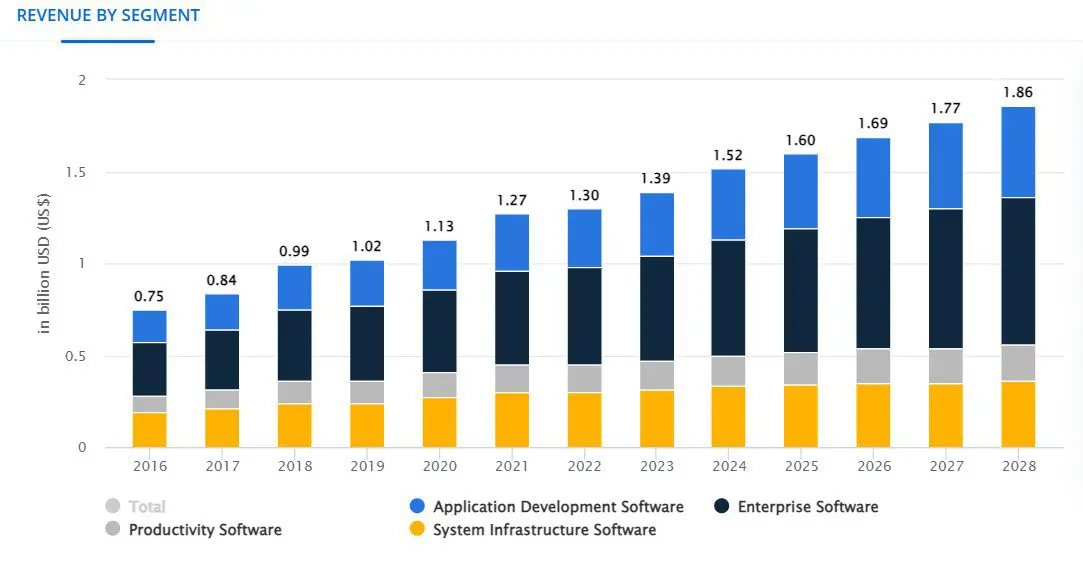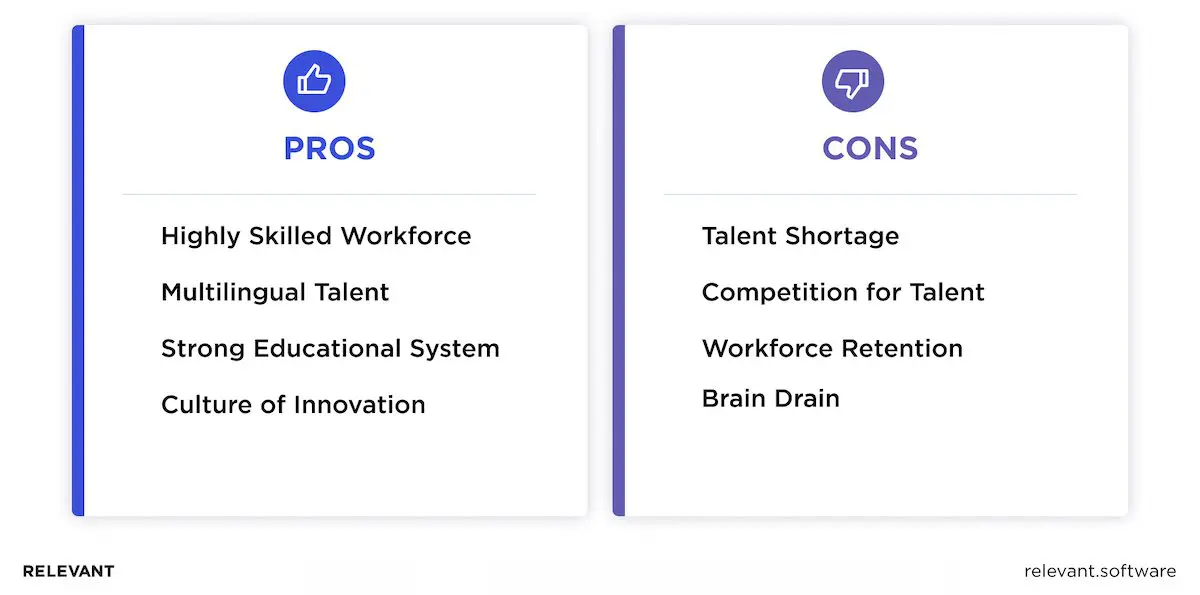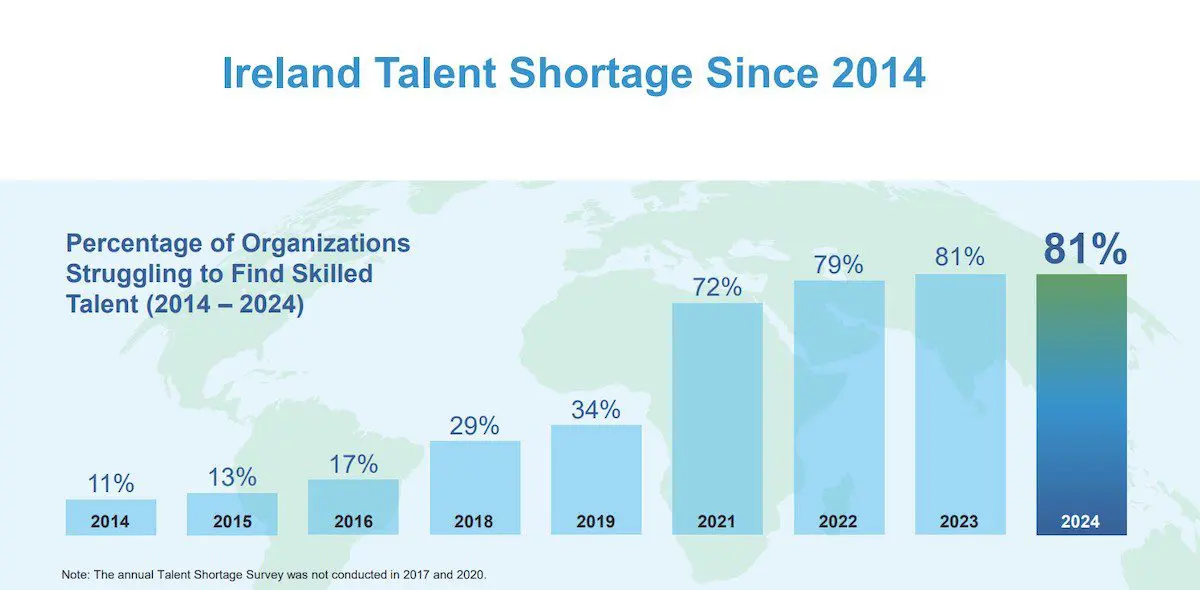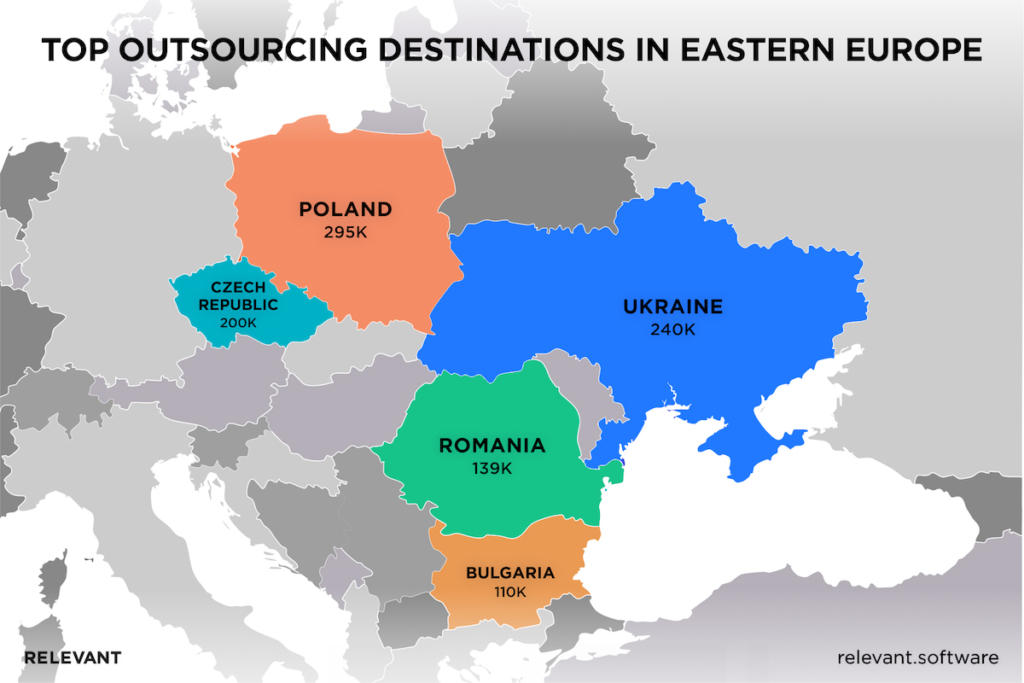Hints for Software Product Development Services in Ireland

Finding skilled tech talent for software product development services is like looking for a needle in a meadow for many businesses in Ireland. The demand for software developers, engineers, and IT professionals is sky-high as the tech industry booms – the supply just can’t keep up. Because of this shortage, project delays, rising costs, and missed opportunities are all too common, hampering companies that strive for excellence and aim to stay ahead.
A possible solution for this serious trouble is outsourcing, which involves recruiting skilled teams for software product development projects. It allows Irish businesses to tap into a global talent pool expertise without any constraints inherent in local hiring challenges. With the help of seasoned service providers, Irish companies can ensure top-notch quality, timely delivery, and budget adherence.
from 25 countries outsourced software development to Relevant
We provide companies with senior tech talent and product development expertise to build world-class software.
Looks promising, right? But are there any drawbacks? Just read on! In our review, we’ll explain the details of product development services (particularly in Ireland) and provide stress-free tips for hiring dedicated developers.
What is Software Product Development?
If we try to get by with one sentence, then software product development is the process that takes your idea from a concept to a usable product with a solid competitive edge. It’s like building a house: you start with a concept, create blueprints, construct the structure, ensure everything works perfectly, and then maintain it. But let’s go through the stages separately:
Ideation and Conceptualization
The first phase in software product development is ideation and conceptualization. This involves brainstorming ideas and defining the software’s purpose and goals. At this stage, developers and stakeholders consider the target audience, the problems the software aims to address, and the critical features it should have. This phase sets the foundation for the entire project, with an assessment of potential risks through market research and competitor analysis.
Design and Prototyping
Once the concept is clear, developers draft detailed plans and visual mockups of the software, focusing on product design and user experience. This phase covers developing the user interface (UI) and user experience (UX) to guarantee the software is accessible and easy to use. Prototypes are then built to test design concepts and collect valuable feedback from early users. Additionally, this stage may involve the creation of a minimum viable product (MVP) to validate user demand before moving to full-scale development of the final product.
Development and Testing
At this stage, developers code, integrate various parts, and assemble the software according to the design specifications. Afterward, it’s time for testing—checking the software for bugs, performance issues, and usability problems through unit tests, integration tests, and user acceptance tests to ensure the software meets standards and functions as required. This leads to the final stage of production and launch, where product development companies finalize the code, provide quality assurance (QA) services, and deploy the software, completing the entire process.
Deployment and Maintenance
The final phase is deployment and maintenance. After all testing stages are complete, the software moves into the production environment for user access. Yet, the development process doesn’t end here. Ongoing maintenance in software product development services is necessary to address any issues that arise, update the software to keep it relevant and add new features as needed.
Types of Software Product Development Services Offered
Software product development offers a wide range of services designed to meet diverse needs. Here are some key types of services you can expect:
- Custom Software Development: Whether you need a unique tool to streamline your business operations or a specialized app for your customers, custom software development services ensure you get exactly what you need. In this process, the vendor starts by getting to know your business, pinpointing your needs, and crafting a solution from the ground up.
- Software Product Redesign Services: Sometimes, existing software needs a makeover. Maybe it’s outdated, not user-friendly, or simply doesn’t meet your current needs. Software product redesign services can bring your software back to life – revamp the user interface, enhance functionality, and ensure the software performs optimally. It’s like a home renovation – keeping the structure but modernizing everything else.
- Mobile and Web Application Development: In today’s world, a strong online presence is crucial. Whether you need a mobile app to connect with customers on the go or a web application to enhance your online services, mobile and web software product development services for startups and large enterprises cover it all.
Current Trends in Software Product Development Services
New trends emerge and shape how developers create and deliver solutions. Here’s a breakdown of some recent trends that influence the world of new software product development services:
| Category | Key Trends and Insights |
| Tech Stack Transformation | Cloud-Native Development: Transition to cloud platforms like AWS, Azure, and Google Cloud Platform, which offer scalable and cost-effective solutions. Microservices Architecture: Breaking down applications into smaller, independent services for better maintainability and flexibility. Low-Code/No-Code Development: Platforms enable faster app development with minimal coding, empowering non-programmers, though less suitable for complex functionalities. |
| AI and Automation | Artificial Intelligence (AI) and Machine Learning (ML): Increasingly embedded in applications, particularly within healthcare, finance, and manufacturing sectors. Robotic Process Automation (RPA): Repetitive task automation improves workflow efficiency and allows developers to focus on complex tasks. |
| Focus on User Experience (UX) and Design | User-Driven Design: Prioritizes user experience through user research, usability tests, and iterative development to build intuitive and engaging applications. |
| Security and Sustainability | Cybersecurity: Importance of secure code practices and embedding security throughout the development process to reduce cyber threats. Sustainability: Development of eco-friendly software solutions that optimize performance to reduce energy consumption in the Internet of Things (IoT). |
| DevOps and Agile (Scrum) Methodologies | DevOps: Synergy between development and operations teams to ensure smoother rollouts and more effective development lifecycles. Agile Development: Supporting faster, iterative cycles to promptly adjust to shifting demands. |
| Cloud Computing and SaaS | SaaS and Cloud Computing: Transform how software is delivered and consumed. Businesses move to the cloud for cost savings, scalability, and ease of access. SaaS offers a subscription-based model that is both flexible and economical, providing regular updates without maintenance hassles. |
| Additional Trends | Rise of Open Source Software: Widespread adoption fosters innovation and knowledge sharing. Increased Focus on Data Privacy: Compliance with regulations like GDPR to protect user data. Demand for Soft Skills: Importance of communication, collaboration, and problem-solving skills for developers. |
Ireland’s Software Industry: What’s in Store?
Since our article focuses on development in Ireland, we will also delve into the unique characteristics of the Irish tech industry.

Ireland’s software market has been on a roll, becoming one of the fastest-growing sectors in the Irish economy. This growth is propelled by its excellent infrastructure, highly skilled professionals, and a supportive business climate. This combination attracts both new startups and well-established companies that aim to innovate and expand.
April saw an unprecedented surge in startups in Northern Ireland, as reported by the UK’s insolvency and restructuring trade body R3. Creditsafe data indicates that 2,311 new companies launched last month, a new record since December 2021. This milestone marks only the second instance of startups surpassing the 2,000 mark. Compared to March, which had 1,728 new businesses, April experienced a 33.7% rise. Additionally, this figure is 188.5% higher than in April 2023, when 801 startups were recorded.
Revenue in the Irelands Software Market
The software market’s growth is tied to Ireland’s strong, tech-focused economy and its access to the European Union market, offering numerous opportunities for expansion. Below, we present a Statista breakdown by segment:

Source: Statista
Irish Tech Hubs and Their Influence
Ireland’s tech industry thrives across several key cities, each contributing uniquely to the sector’s overall growth and innovation.
- Dublin: The capital city is the undisputed tech hub of Ireland, housing major tech giants like Google, Facebook, Apple, IBM, and Intel. Dublin is known for its concentration of multinational corporations and highly skilled workforce.
- Cork: Often referred to as Ireland’s “second city,” Cork is a vibrant tech hub with a strong focus on areas like life sciences, pharmaceuticals, and fintech. Companies like Apple, EMC, and Ericsson have a significant presence in Cork.
- Galway: This western city is fast becoming a tech hub, attracting both startups and established firms. With a strong university (National University of Ireland Galway) and a growing talent pool, Galway is now a center for innovation and entrepreneurship.
The Role of IDA Ireland
IDA Ireland is the country’s foreign direct investment agency and plays a crucial role in promoting the software industry. They actively attract multinational corporations to Ireland by offering:
- Competitive tax rates for businesses
- A highly skilled and educated workforce
- Government grants and financial support
- Streamlined business process setup
Additionally, as a member of the European Union, Ireland benefits from access to a vast market of potential customers and a supportive regulatory framework.

Investment and Employment Trends
Ireland’s IT sector continues to attract significant investment, with 139 new projects in the first half of 2023 alone. These investments are projected to create over 12,000 jobs in 2024, continuing the strong trend of growth seen since 2015. Impressively, 48% of these investments are earmarked for regional locations, which demonstrates a holistic approach and commitment to spreading tech industry benefits across the country.
Factors Contributing to Success
Several additional factors have played a role in shaping Ireland’s success in today’s digital landscape. First and foremost, it is:
- Government Support: Ireland’s government has consistently prioritized the development of the tech sector through favorable policies, research funding, and infrastructure investment for software product development services for startups. This support creates a conducive environment for growth and innovation.
- Business-Friendly Environment: Ireland offers a stable political climate, a transparent legal system, and a strong emphasis on research and development. These factors make it an attractive location for tech companies looking to establish or expand their operations.
- Emphasize Diversity: Initiatives that enhance diversity and inclusion in tech seek to draw from a broader talent pool, which involves women and underrepresented minorities.
- Corporate-Educational Cooperation: Tech businesses join forces with educational institutions to match their programs with industry requirements, equipping students with the necessary skills.
Broadly speaking, Ireland’s tech talent market is full of possibilities. However, addressing the talent shortage is crucial for successful new software product development services.
Tech Talent Landscape in Ireland: Strengths and Challenges
Ireland’s booming software industry hinges on its robust tech talent pool. Here’s a closer look at this dynamic landscape, highlighting its strengths and acknowledging the challenges:

Strengths:
- Highly Skilled Workforce: Ireland takes pride in its well-educated population, emphasizing STEM (Science, Technology, Engineering, and Mathematics) education. This ensures a steady stream of qualified professionals for the tech industry, which meets the demands of a growing sector.
- Multilingual Talent: English is widely spoken, which makes it easier for international companies to operate and attract global talent.
- Strong Educational System: Universities and colleges produce graduates equipped with the necessary skills and knowledge for the tech industry.
- Culture of Innovation: Ireland fosters a culture that embraces creativity and encourages a “can-do” attitude, which leads to a dynamic tech environment.
Challenges:
- Talent Shortage: Despite its strengths, 81% of Irish companies face a significant shortage of skilled tech workers. This gap is projected to widen further, posing a threat to the industry’s continued growth.
- Competition for Talent: The presence of numerous tech giants and startups creates fierce competition for top talent, drives up salaries, and makes it harder for smaller companies to compete.
- Workforce Retention: Retaining skilled professionals, even small teams, can be a challenge. Companies need to offer competitive compensation packages, attractive work environments, and opportunities for growth to keep their talent engaged.
- Brain Drain: There’s a concern that some highly skilled professionals may be attracted to work in other tech hubs offering even higher salaries or more career opportunities.

Source: Experis
The need for skilled professionals remains high, driven by intense competition in the digital era. Key areas of need include software engineering (with skills in DevOps, Java, Python, .NET, React, and AngularJs). Site Reliability Engineers, DevSecOps specialists, and Information Security experts are also in high demand.
Cloud Engineers, Business Analysts, Project and Program Managers, Quality Assurance professionals, and Data Engineering and Data Science roles are highly sought after, too. The push towards automation also fuels demand for Software Development Engineers in Test (SDET) and Robotic Process Automation (RPA) roles – seniors or leads with 9–15 years of experience.
To address this shortage, many businesses are turning to Eastern Europe, where IT outsourcing companies like Relevant have well-established Lean, Agile, and DevOps processes to ensure fast development and a quality-first approach based on a mature ISO 9001-certified quality management system.
Why Choose Eastern Europe for Custom Software Product Development Services?
This region has become a hotspot for tech talent, offering a large pool of skilled developers and engineers at competitive rates. Countries like Ukraine have established themselves as key players in the global IT outsourcing market.
Here are some key benefits of outsourcing to Eastern Europe:
- Cost-Effective Solutions: Outsourcing to Eastern Europe can save businesses a lot of money. Skilled professionals in this region offer their services at lower rates compared to their counterparts in Western Europe or the United States. This allows companies to stretch their budgets while still getting top-quality work, which offers a competitive advantage.
- High-Quality Talent: Eastern Europe has a strong educational focus on science and technology, producing a steady stream of qualified graduates. These professionals are up-to-date with the latest technologies and methodologies, making it easier for businesses to find the expertise they need.
- Cultural Compatibility: Cultural similarities and small time zone differences between Eastern Europe and Western Europe make communication and teamwork smoother, leading to successful projects.
- Strong Work Ethic: Eastern European professionals are known for their dedication and hard work. They often go the extra mile to meet deadlines and deliver excellent results, making them reliable partners for any project.
- Advanced Technical Skills: Eastern European developers are proficient in various programming languages and technologies. Whether it’s software engineering, cybersecurity, cloud computing, or AI/ML, they have the skills to tackle complex and innovative projects.
- Scalability: Outsourcing offers the flexibility to adjust operations quickly, whether you need to expand or reduce your team.
So, if you struggle to find and keep skilled professionals, outsourcing to Eastern Europe sounds like a practical solution. However, when you go to outsource, you must understand that your project’s outcome directly depends on your choice.

Finding the Partner for Outsourced Software Product Development Services in Ireland
Here are some key factors to consider when choosing a custom software product development services partner in Ireland:
- Experience: A solid track record means they’ve encountered and overcome various challenges, which can be invaluable for your project. Check their portfolio and client testimonials to gauge their expertise in your specific industry. Websites like Clutch and GoodFirms provide detailed reviews and ratings of IT service providers.
- Expertise: Whether it’s custom software development, mobile app development, or redesigning existing software, the right partner should have deep expertise in the relevant technologies and methodologies. Ask for case studies or examples of similar projects they have completed successfully.
- Customer Service: You want a partner who listens to your specific needs, communicates clearly, and responds promptly. A company that values customer service will be more likely to deliver a product that meets your expectations. Assess the provider’s communication skills during initial interactions.
- Local Insight and Global Reach: A partner who knows the local market well can offer tailored insights and solutions. Yet, they should also have a global perspective and the ability to utilize international best practices.
We stress these points for a reason. Every one of them is crucial for successful outsourced software product development services. At the end of the day, finding the right partner to stand by you in this competitive landscape is what matters most.
Build your Software Product with Relevant Team
Outsourced software product development services demand innovation, expertise, and the right development partner. Relevant Software is ready to help you bring your vision to life. Here’s why partnering with us can address your tech talent gap in Ireland and ensure your project’s success:
- We Build Custom Solutions: We recognize that every business is unique. That’s why our custom software development services are designed to fit your unique needs. Whether you’re looking to streamline operations, enhance customer experiences, or launch a new product, our custom software product development services fit perfectly with your goals.
- We Bring a Wealth of Experience: Our developers, designers, and project managers have worked on numerous projects in different fields. This means we can handle any challenge that comes our way, ensuring your software is built to the highest standards.
- We Prefer Client-Centric Approach: At Relevant Software, we prioritize your satisfaction. Our customer service is second to none, with a focus on clear communication, transparency, and responsiveness. You’ll stay updated at all stages of development, making sure the end product is exactly what you want.
- We Have Local Understanding and Global Reach: We deeply understand the local market and our capabilities extend globally. This combination allows us to use international best practices while providing solutions that are relevant to your local context.
- We Commit to Quality: Quality is at the heart of everything we do. From the initial concept to the final deployment, we ensure every aspect of your software product development solutions is meticulously built and rigorously tested.
Aren’t these reasons compelling enough for you to choose us to realize your ideas? If so, contact us to start!


Hand-selected developers to fit your needs at scale! Let’s build a first-class custom product together.

